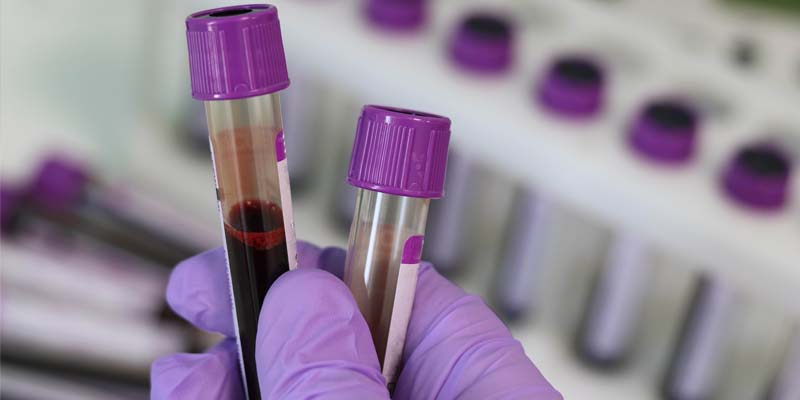*/

In courts across the UK blood alcohol testing is an essential part of the evidential picture, providing an insight into an individual’s alcohol consumption. In cases where the safeguarding of children and vulnerable people is paramount, such tests provide a rich source of information, enabling counsel to act on urgent welfare needs. But when it comes to blood alcohol tests, not all are created equal, with Phosphatidylethanol (PEth) testing providing the most conclusive insight into drinking patterns.
There are four main types of blood alcohol testing, all of which can provide us with a four-week historic overview of alcohol use:
Unlike CDT, LFT and MCV – all of which are indirect biomarkers of alcohol and whose presence can be affected by pre-existing medical conditions and medications, among other factors – PEth is a direct biomarker of alcohol. This means that it is only present in the body when alcohol has been consumed. An abnormal phospholipid, it requires ethanol for its production.
PEth production begins as soon as ethanol is consumed and accumulates in the blood with frequent alcohol consumption, giving it a high specificity (48-89%) and sensitivity (88-100%). Experiments show that PEth can be detected in blood after one to two hours, and for up to 12 days after a single drinking episode. In addition, daily alcohol consumption of more than 60g of ethanol (7.5 units) can clearly be distinguished from lower alcohol consumption. As such, PEth testing can detect chronic and single-drinking episodes.
The wealth of information provided by a PEth test, alongside its conclusiveness, is what makes it the most essential of all blood alcohol tests, enabling us to monitor abstinence, drinking behaviour, or identify relapse. PEth analysis is also the only blood alcohol test that can be undertaken during pregnancy or within two months of the birth.
In fact, recognition of the value of PEth testing is on the rise, with sales of such tests having more than doubled year-on-year among the legal profession (AlphaBiolabs sales data, 2020-21).
PEth is second only to the detection of ethyl glucuronide (EtG) and ethyl palmitate (EtPa): a fatty acid ethyl ester (FAEE) in the hair. Both EtG and EtPa are direct biomarkers of alcohol and give us a highly accurate insight into patterns of drinking, with a three- or six-month overview of usage. Each is absorbed into the hair via different routes, and their levels can assist in assessing excessive alcohol consumption.
EtG is water soluble, produced in the liver and can be impacted by various hair treatments including excessive washing. EtPa is formed in the sebaceous glands from ethanol diffusing from the blood circulation and then deposited into hair primarily from sebum (from the oil glands on the scalp). EtPa (FAEEs) are lipophilic so while not water soluble, its presence can be affected using alcohol-containing hair products such as sprays, gels, and wax.
Because of their respective strengths and weaknesses, both EtG and EtPA tests should be performed, and their findings used to support each other, as shown in LB Richmond v B & W & B & CB [2010] EWHC 2903 (Fam), where Mr Justice Moylan gave guidance on the evidential worth of hair strand testing. Within his guidance, it was also stressed that hair strand tests should not be used in isolation to reach evidential conclusions.
By performing these tests in conjunction with PEth and other blood tests, a more holistic conclusion can be drawn as to a person’s alcohol use.
Blood alcohol testing combined with hair testing provides us with the fullest picture from which to draw conclusions. This is especially important in family cases, where safeguarding children and vulnerable people is the highest priority. Using highly accurate scientific analysis and examining the way in which the body absorbs alcohol, a case can be made to protect those in need – and reunite families where abstinence has been achieved.

In courts across the UK blood alcohol testing is an essential part of the evidential picture, providing an insight into an individual’s alcohol consumption. In cases where the safeguarding of children and vulnerable people is paramount, such tests provide a rich source of information, enabling counsel to act on urgent welfare needs. But when it comes to blood alcohol tests, not all are created equal, with Phosphatidylethanol (PEth) testing providing the most conclusive insight into drinking patterns.
There are four main types of blood alcohol testing, all of which can provide us with a four-week historic overview of alcohol use:
Unlike CDT, LFT and MCV – all of which are indirect biomarkers of alcohol and whose presence can be affected by pre-existing medical conditions and medications, among other factors – PEth is a direct biomarker of alcohol. This means that it is only present in the body when alcohol has been consumed. An abnormal phospholipid, it requires ethanol for its production.
PEth production begins as soon as ethanol is consumed and accumulates in the blood with frequent alcohol consumption, giving it a high specificity (48-89%) and sensitivity (88-100%). Experiments show that PEth can be detected in blood after one to two hours, and for up to 12 days after a single drinking episode. In addition, daily alcohol consumption of more than 60g of ethanol (7.5 units) can clearly be distinguished from lower alcohol consumption. As such, PEth testing can detect chronic and single-drinking episodes.
The wealth of information provided by a PEth test, alongside its conclusiveness, is what makes it the most essential of all blood alcohol tests, enabling us to monitor abstinence, drinking behaviour, or identify relapse. PEth analysis is also the only blood alcohol test that can be undertaken during pregnancy or within two months of the birth.
In fact, recognition of the value of PEth testing is on the rise, with sales of such tests having more than doubled year-on-year among the legal profession (AlphaBiolabs sales data, 2020-21).
PEth is second only to the detection of ethyl glucuronide (EtG) and ethyl palmitate (EtPa): a fatty acid ethyl ester (FAEE) in the hair. Both EtG and EtPa are direct biomarkers of alcohol and give us a highly accurate insight into patterns of drinking, with a three- or six-month overview of usage. Each is absorbed into the hair via different routes, and their levels can assist in assessing excessive alcohol consumption.
EtG is water soluble, produced in the liver and can be impacted by various hair treatments including excessive washing. EtPa is formed in the sebaceous glands from ethanol diffusing from the blood circulation and then deposited into hair primarily from sebum (from the oil glands on the scalp). EtPa (FAEEs) are lipophilic so while not water soluble, its presence can be affected using alcohol-containing hair products such as sprays, gels, and wax.
Because of their respective strengths and weaknesses, both EtG and EtPA tests should be performed, and their findings used to support each other, as shown in LB Richmond v B & W & B & CB [2010] EWHC 2903 (Fam), where Mr Justice Moylan gave guidance on the evidential worth of hair strand testing. Within his guidance, it was also stressed that hair strand tests should not be used in isolation to reach evidential conclusions.
By performing these tests in conjunction with PEth and other blood tests, a more holistic conclusion can be drawn as to a person’s alcohol use.
Blood alcohol testing combined with hair testing provides us with the fullest picture from which to draw conclusions. This is especially important in family cases, where safeguarding children and vulnerable people is the highest priority. Using highly accurate scientific analysis and examining the way in which the body absorbs alcohol, a case can be made to protect those in need – and reunite families where abstinence has been achieved.


The Bar Council continues to call for investment for the justice system and represent the interests of our profession both at home and abroad
By Marie Law, Director of Toxicology at AlphaBiolabs
AlphaBiolabs has made a £500 donation to Sean’s Place, a men’s mental health charity based in Sefton, as part of its ongoing Giving Back initiative
Q&A with Tim Lynch of Jordan Lynch Private Finance
By Marie Law, Director of Toxicology at AlphaBiolabs
By Louise Crush of Westgate Wealth Management
Little has changed since Burns v Burns . Cohabiting couples deserve better than to be left on the blasted heath with the existing witch’s brew for another four decades, argues Christopher Stirling
Six months of court observation at the Old Bailey: APPEAL’s Dr Nisha Waller and Tehreem Sultan report their findings on prosecution practices under joint enterprise
Despite its prevalence, autism spectrum disorder remains poorly understood in the criminal justice system. Does Alex Henry’s joint enterprise conviction expose the need to audit prisons? asks Dr Felicity Gerry KC
With automation now deeply embedded in the Department for Work Pensions, Alexander McColl and Alexa Thompson review what we know, what we don’t and avenues for legal challenge
It’s been five years since the groundbreaking QC competition in which six Black women barristers, including the 2025 Chair of the Bar, took silk. Yet today, the number of Black KCs remains ‘critically low’. Desirée Artesi talks to Baroness Scotland KC, Allison Munroe KC and Melanie Simpson KC about the critical success factors, barriers and ideas for embedding change